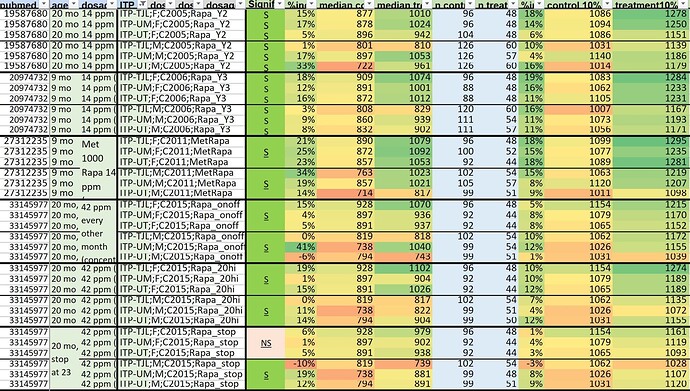https://www.facebook.com/photo/?fbid=2423694691123001&set=gm.5785316468221792&idorvanity=429252437161582
If you were a mouse, you could hope to extend your life by 25% with a combination of rapamycin and metformin. Perhaps more, but the research hasn’t tested that yet.
If you are a human…
I think these are things to test. It starts to be well advanced science that goes far beyond mice, with drugs that are taken by millions of patients every year — with Josiah Agboluwaga Akinloye and
2 others
.

International Longevity Alliance
Edouard Debonneuil · ·
If you were a mouse, should you take rapamycin? at what dose, intermittently or continuously, and starting when? Should you also take metformin? Here is what the data says, to increase lifespan by about 25% if you are a mouse – not so bad!
Context: as part of the COLLIDA project (please anyone is welcome to participate - Collective Collection of Lifespan Data, and consequent analysis), with Leon Pesha we started by collected the data about rapamycin from the NIA Intervention Testing Program (ITP) and to analyze it, while having a view on whether the controls are coincidentally short- or long- lived (an aspect generally forgotten, but that plays a big role in interpretations especially in males cages – more to come soon on this, but for now you can look at the colors on column “median control” to understand, and as a teaser I can sadly say “berberine” and “fisetin”…)
Result: regarding rapamycin, if you were a mouse,
-
use a low-to-medium-dose!: 14 or 42 ppm : it is not clear that 42 ppm is better and 14 seems even slightly better — so no need to try high doses, it might do more harm than good
-
long-term-use for much better results!:
the short term use when retired and still healthy (from month 20 to 23) provides a NON-significant increase despite many mice (last 6 lines of the picture; the appearent statisticant increase in males at the bottom is ONLY due to coincidental short-lived controls – males fight I can guess)
- OK to start at retirement!:
the difference is very slim with starting at young adulthood, so this is perhaps the good news for many mice 
- intermittently is OK, though it is not as efficient as contant.
A good news for safety (no detrimental rebound effect)
despite lower median lifespan of all controls in the 14ppm rapamycin + 1000ppm metformin 2015 experiment than in the same experiment without metformin in 2006, all treated groups had a longer lifespan than their counterparts without metformin. On average, rapamycin increased lifespan by 10-15% and metformin too! At a time when doubts are emerging about metformin, this is good news, at least in association with rapamycin.
Important disclaimer: do not take rapamycin and metformin on your own, consult your medical doctor. Even though rapamycin studies by the ITP in non-human primates suggest similar medium term actions and even though numerous patients were given rapamycin at high doses and even if the above studies were done in humans, anyone may have undesirable side effects.
Next?: we are going to explore the rest of the ITP data and start exploring non-ITP data, to help guide research on what to test next as a non-ending, practical, efficient guide for healthy life extension research (COLLIDA project). For non-ITP data, we need your help! It is a project that can be distributed across many people who give a few hours of time.

